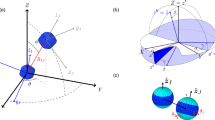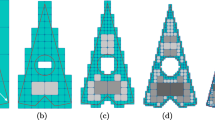Abstract
We present a particle-based approach for generating adaptive triangular surface and tetrahedral volume meshes from computer-aided design models. Input shapes are treated as a collection of smooth, parametric surface patches that can meet non-smoothly on boundaries. Our approach uses a hierarchical sampling scheme that places particles on features in order of increasing dimensionality. These particles reach a good distribution by minimizing an energy computed in 3D world space, with movements occurring in the parametric space of each surface patch. Rather than using a pre-computed measure of feature size, our system automatically adapts to both curvature as well as a notion of topological separation. It also enforces a measure of smoothness on these constraints to construct a sizing field that acts as a proxy to piecewise-smooth feature size. We evaluate our technique with comparisons against other popular triangular meshing techniques for this domain.













Similar content being viewed by others
References
Alliez P, Cohen-Steiner D, Yvinec M, Desbrun M (2005) Variational tetrahedral meshing. ACM Trans Graph 24(3):617–625
Amenta N, Bern MW (1999) Surface reconstruction by Voronoi filtering. Discret Comput Geom 22(4):481–504
Antani L, Delage C, Alliez P (2007) Mesh sizing with additively weighted Voronoi diagrams. In: Proceedings of 16th IMR, pp 335–346
Boissonnat JD, Oudot S (2005) Provably good sampling and meshing of surfaces. Graph Models 67(5):405–451
Chen L (2004) Mesh smoothing schemes based on optimal Delaunay triangulations. In: Proceedings of 13th IMR, pp 109–120
Cheng SW, Dey TK (2008) Maintaining deforming surface meshes. In: Proceedings of 19th symposium on discrete algorithms, pp 112–121
Cheng SW, Dey TK, Levine JA (2007) A practical Delaunay meshing algorithm for a large class of domains. In: Proceedings of 16th IMR, pp 477–494
Cheng SW, Dey TK, Ramos EA (2010) Delaunay refinement for piecewise smooth complexes. Discret Comput Geom 43(1):121–166
Cheng SW, Poon SH (2006) Three-dimensional Delaunay mesh generation. Discret Comput Geom 36(3):419–456
Chew LP (1989) Guaranteed-quality triangular meshes. Technical Report TR-89-983, Computer Science Department, Cornell University
Dey TK, Levine JA (2009) Delaunay meshing of piecewise smooth complexes without expensive predicates. Algorithms 2(4):1327–1349
Dey TK, Li G, Ray T (2005) Polygonal surface remeshing with Delaunay refinement. In: Proceedings of 14th IMR, pp 343–361
Dey TK, Sun J (2006) Normal and feature approximations from noisy point clouds. In: Foundation of Software Technology and Theoretical Computer Science, pp 21–32
Du Q, Wang D (2003) Tetrahedral mesh generation and optimization based on centroidal Voronoi tessellations. Int J Numer Methods Eng 56(9):1355–1373
Haimes R, Aftosmis MJ (2002) On generating high quality watertight triangulations directly from CAD. In: International Society for Grid Generation
Haimes R, Follen GJ (1998) Computational analysis programming interface. In: Proceedings of 6th International Conference Numerical Grid Generation in Computer Field Simulation, pp 663–672
Hart JC, Bachta E, Jarosz W, Fleury T (2005) Using particles to sample and control more complex implicit surfaces. In: SIGGRAPH ’05 Courses. New York, USA, p 269
Jones WT (2004) Toward a global parameterization for quilted CAD entities. In: Proceedings of 42nd AIAA aerospace sciences meeting and exhibit. AIAA Paper 2004-0611
Karkanis T, Stewart AJ (2001) Curvature-dependent triangulation of implicit surfaces. IEEE Comput Graphics Appl 21(2):60–69
Lohner R (1995) Surface gridding from discrete data. In: Proceedings of 4th IMR, pp 29–44
Meyer MD, Georgel P, Whitaker RT (2005) Robust particle systems for curvature dependent sampling of implicit surfaces. In: Proceedings of the International Conference on Shape Modeling and Applications (SMI), pp 124–133
Meyer MD, Kirby RM, Whitaker RT (2007) Topology, accuracy, and quality of isosurface meshes using dynamic particles. IEEE Trans Vis Comput Graph 13(6):1704–1711
Meyer MD, Whitaker RT, Kirby RM, Ledergerber C, Pfister H (2008) Particle-based sampling and meshing of surfaces in multimaterial volumes. IEEE Trans Vis Comput Graph 14(6):1539–1546
Rineau L, Yvinec M (2007) Meshing 3d domains bounded by piecewise smooth surfaces. In: Proceedings of 16th IMR, pp 443–460
Ruppert J (1995) A Delaunay refinement algorithm for quality 2-dimensional mesh generation. J Algorithms 18(3):548–585
Scheidegger CE, Fleishman S, Silva CT (2005) Triangulating point set surfaces with bounded error. In: Symposium on Geometry Proceedings, pp 63–72
Schreiner JM, Scheidegger CE, Fleishman S, Silva CT (2006) Direct (re)meshing for efficient surface processing. Comput Graph Forum 25(3):527–536
Shewchuk JR (1996) Triangle: engineering a 2D quality mesh generator and Delaunay triangulator. In: Lin MC, Manocha D (eds) Applied computational geometry: towards geometric engineering, Springer, USA, pp 203–222
Shewchuk JR (1998) Tetrahedral mesh generation by Delaunay refinement. In: Proceedings of 14th symposium on computational geometry, pp 86–95
Si H, Gärtner K (2005) Meshing piecewise linear complexes by constrained Delaunay tetrahedralizations. In: Proceedings of 14th IMR, pp 147–163
Tournois J, Alliez P, Devillers O (2007) Interleaving Delaunay refinement and optimization for 2d triangle mesh generation. In: Proceedings of 16th IMR, pp 83–101
Tournois J, Wormser C, Alliez P, Desbrun M (2009) Interleaving Delaunay refinement and optimization for practical isotropic tetrahedron mesh generation. ACM Trans Graph 28(3):1–9
Turk G (1992) Re-tiling polygonal surfaces. In: Proceedings of SIGGRAPH ’92, pp 55–64
Valette S, Chassery JM, Prost R (2008) Generic remeshing of 3d triangular meshes with metric-dependent discrete Voronoi diagrams. IEEE Trans Vis Comput Graph 14(2):369–381
Witkin AP, Heckbert PS (1994) Using particles to sample and control implicit surfaces. In: Proceedings of SIGGRAPH ’94, pp 269–277
Yamakawa S, Shimada K (2000) High quality anisotropic tetrahedral mesh generation via ellipsoidal bubble packing. In: Proceedings of 9th IMR, pp 263–274
Yan DM, Lévy B, Liu Y, Sun F, Wang W (2009) Isotropic remeshing with fast and exact computation of restricted Voronoi diagram. Comput Graph Forum 28(5):1445–1454
Acknowledgments
This research was supported by NIH/NIGMS Center for Integrative Biomedical Computing, 2P41-RR0112553-12.
Author information
Authors and Affiliations
Corresponding author
Rights and permissions
About this article
Cite this article
Bronson, J.R., Levine, J.A. & Whitaker, R.T. Particle systems for adaptive, isotropic meshing of CAD models. Engineering with Computers 28, 331–344 (2012). https://doi.org/10.1007/s00366-012-0266-x
Received:
Accepted:
Published:
Issue Date:
DOI: https://doi.org/10.1007/s00366-012-0266-x




